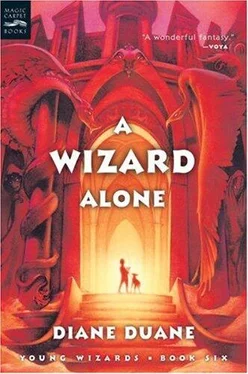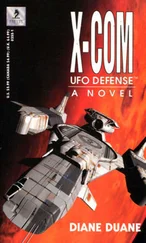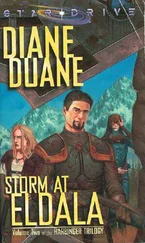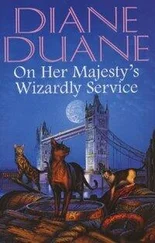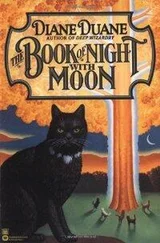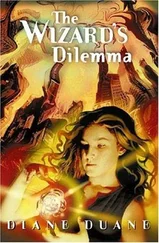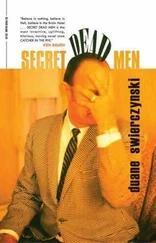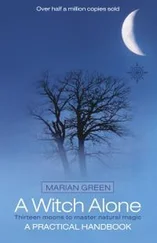, he thought, opening the cupboard over the counter.
There were no cornflakes. There was one box of his pop’s shredded wheat, which Kit detestedwhenever circumstances forced him to eat it, it always made him think he was eating a scrubbing pad. The only other box contained one of the cereals his sister liked, some kind of frosted, fruitflavored, multicolored, marshmallow-infested, hyperpuffed, vitamin-reinforced starch construct, which was utterly inedible due to its being ninety-eight percent sugar — even though the word appeared on the box only once, in letters small enough for anyone without a magnifying glass to miss. “Mama,” Kit said, aggrieved, “we’re out of cereal!”
“Your kind, anyway. I know,” his mother said, coming into the kitchen for another cup of coffee, with the TV remote in her hand. “Take it up with your pop: He had a fit of wanting cornflakes late last night, and he finished the box. He said he’d get some more on his way home from work. Have some toast.”
“It’s not the same,” Kit muttered, but all the same he closed the cupboard and went to get the bread out of the fridge.
“Is Ponch all right now?” his mother said as she poured more coffee and reached past Kit into the fridge for the milk.
“I think so. Still sleeping, anyway.”
His mama shook her head, and then smiled slightly. “All that noise last night… it reminded me.
Is it just me, or has down-the-street’s dog been louder than usual the past week or so?”
“You mean Tinkerbell?” That was not the dog’s real name in the dogs’ own language, Cyene, and possibly reason enough for the down-the-street dog’s incessant barking. “I dunno, Mama. I’m so used to hearing him bark all the time, I don’t notice anymore.”
“Do you think you could talk to him, sweetie? You know.” She wiggled her fingers in what she imagined was a vaguely wizardly gesture.
Kit raised his eyebrows while he put the bread in the toaster. “I can try. But, Mama, just because I talk to him doesn’t necessarily mean he’s going to listen. The dog’s a head case. He thinks I’m a crook. But then he thinks everybody who doesn’t live in his house is a crook.”
“Dogs get like their owners, they say…”
“Huh?”
“Nothing, sweetie,” his mother said, looking suddenly guilty.
Kit kept the smile off his face while he waited for the toast to come up. It was going to be fun to be middle-aged, someday, and be told the things his mother was really thinking, with no more need for the kid-filter that parents routinely seemed to self-install.
“What about the youngster whose head you were going to get into?” his mother said. “Were you able to talk to him?”
Kit shook his head. “He was real busy,” Kit said. “Ponch and I are going to have to try again, when things are quieter.” If they get any quieter , he thought. And what if they don’t ?
Then something else occurred to him. “Mom, you have any more trouble with the TV?”
“What?” She looked at Kit as if she couldn’t understand what he was talking about, and then blinked. “Oh. No, it’s been all right.”
“Good,” Kit said, and started buttering the toast.
“Except now that you mention it…”
Kit braced himself.
“Your dad told me you weren’t joking. About the cooking shows…”
Kit sat down with his toast and tried desperately not to look as if he was about to have a panic attack. “Yeah.”
His mother sat down across from Kit, looking thoughtfully at her coffee cup. “Honey, none of these people have ever tried to eat you , have they?”
“Aliens? No.” That, at least, was the truth. “They might have thought about it, though. But so far it’s not a crime to think about it. At least, not most places.”
His mother’s expression relaxed a little. “No, I guess I can see where it might not be. I just worry about you, that’s all.“
Kit finished one piece of toast. “Mama, in one way it’s like crossing the street. You know you have to watch out for traffic. So you look both ways before you cross. In some parts of the universe, you know that the locals think of you as a potential snack food, and you’re just careful when you visit them not to act like a snack. But mostly”—Kit grinned—“wizards are nobody’s snack. Dealing with those species mostly isn’t any more dangerous than crossing the street. Also, some of them owe us.”
His mama looked surprised. “What, humans?” “No, wizards.” Kit took a bite of the next piece of toast. “One of those species, the—” He paused; he wasn’t used to saying their name except in the Speech, since their own word for themselves was hard to say. “Let’s call them the Spinies, because they’ve got a lot of spines. They had a problem a while back: Their sun was going to go nova. One of us went in there and kept that from happening. It’s not like they don’t have their own wizardsthey do. But a wizard from another species was passing through, caught the problem before any of them did, and fixed it.” He shook his head. The story ranked as a hero-tale even among wizards, who, because of their line of work, were more or less used to saving the world, or worlds. “It was real time-critical stuff. The one who saved them came from one of the species that they normally would have thought of as food: humanoid, like us. The wizardry was a big one, complex — messing with the carbon cycle inside a star isn’t for beginners. Doing the wizardry killed her. And the word got out. Now all the Spinies have something else to think about. ‘Be nice to your food; it might save your life.’“
Kit worked on the second piece of toast while his mother thought about that.
“She was how old?” his mother said suddenly.
Kit had been hoping this wouldn’t come up. “If you did it in human years,” he said, “she’d have been about my age.”
His mother’s gaze rested on him as if a suspicion had been confirmed. “Does this kind of thing happen often?” she said.
It was so tempting to lie… but no temptation was more fatal for a wizard. “Every day, Mama,” Kit said. “There aren’t enough of us to do the job. Probably there never will be. Lots of us die of old age, in our beds. But some of us…”
His mother looked at him, and her expression changed. It became less confused, but the look that replaced it troubled Kit more, for reasons he couldn’t understand. “I don’t know why this surprises me,” she says. “I’m a nurse, after all. It looks like we’re both in a service profession. I just keep thinking you should have been offered a choice when you were old enough to understand what you were choosing.”
“I was,” Kit said. He pushed the plate away. “You told me you decided to be a nurse when you were eight.”
His mama’s expression turned first shocked, then annoyed: the look of someone who doesn’t expect to have her own revelations turned against her. “Yes, but—”
“You’re gonna say that you didn’t know everything that’d be involved in being a nurse, when you were eight,” Kit said. “And right then being a nurse mostly looked to you like a pink plastic kit with a toy stethoscope and a toy thermometer in it. But you decided, anyway, because you wanted to help people. So when you were old enough you went to nursing school, and look, now you’re a nurse. And it’s not so bad. Right?”
His mother looked at him.
“That’s what it’s like to be a wizard,” Kit said. “I promise, I’ll keep letting you know what it looks like as I get older. But when I ‘signed up,’ I knew this was what I wanted to do. I knew right away. Sure, it gets more complicated as you go on. But doesn’t everything?”
Читать дальше
